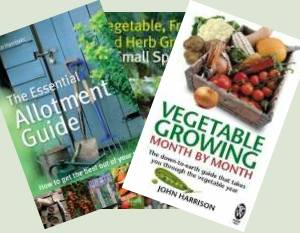Rest of the Potatoes
I popped down on Tuesday for an hour late afternoon and got up the last few potatoes overlooked from last year. Still, 3kg of organic spuds for nothing (apart from some blood, sweat and tears) isn’t bad.
Digging
Today I deserted the office at 3pm and headed down to the plot. There were a couple of people on the site, which was nice considering it was a grey, damp day so after a quick chat it was down to some healthy exercise.
I dug over a 10 foot run of the allotment, about 150 square feet. Pretty heavy going as the soil is still quite wet. Not bad for two hours work and hopefully I’ll be ready for spring before it arrives – although I don’t think we’ve had a winter yet!
Message from Canada
Had a lovely email from Mrs Logan in Canada. It still impresses me when I think of my ramblings into the ether being read across the world. I remember my father booking an international telephone call, a big deal.
Anyway, Mrs Logan said I could quote from the email if I wished and I think you will find this of interest.
“I find it interesting that your members and forum entries mention many of the veg varieties common or available in Canada, more often from heritage seed companies rather than the large seed companies.
Not surprising considering many plant varieties originally came from France and Italy, and Canada boasts huge populations of both nationalities. Many of the methods employed by your allotment gardeners are very similar to ours, other than where I live in southwestern Ontario, we don’t need to bother with growing tomatoes or cukes under glass as our summer temps and weather are very conducive to their outside growth.
Amusingly, only English cucumbers, with their finicky demands, are grown in greenhouses year round, even in Ontario.
Potatoes, however, are another matter regarding available varieties. You have such interesting sounding names for your varieties, as well as a lot of diseases we don’t have in Canada, so I wouldn’t be in a hurry to grow any of your varieties here. In fact, Canada is so free of many diseases, that we export seed potatoes to other countries afflicted with disease problems (including the U.S.A.)”
She goes on to say:
“Another point of similarity between our country’s gardens is that of the actual time of plant growth. Gardens in SW Ontario are currently sitting under a foot, or more, of snow and -8C temps, and we’ll be under varying amounts of snow until late March.
We always have one last snowstorm in very early April, which melts quickly, then we’re clear for the growing season. From your pictures and diary blog, I think I’d almost prefer our snow to your drizzly wet cold. At least we can cross country ski or sled in snow; hard to do that in mud and drizzle.” I agree with her there!
“For now, our garden soil is pickaxe resistant, but by early April, all the seeds we’ve started indoors can start going outside by varying degrees. Sweet peas are usually directly sown into the ground, same with very early lettuces. By late April we’re directly sowing beans and peas, and putting in all the allium seedlings. Early May means young tomato plants can go outside under protective covers, pails, cloches, whatever, and potatoes, cukes, etc are directly sown around mid May.
Perhaps these planting dates sound late to British gardeners, but we soon get lots of high outdoor temps which push our plants into fast growth and our harvest dates are the same as yours. I think only your spring bulbs come out sooner than ours.”
One of the debates we’ve had on the forums is about the use of peat and its environmental impact. This comment is interesting:
“I’ve noticed on various British websites, especially BBC’s Gardeners’ World, that there is a looming peat shortage over there. It’s been interesting to learn how coir has been adapted for organic use in Britain. In Canada, we still have considerable supplies of peat so coir is an unknown term for many here.
However, like all things, supplies eventually end and it will be interesting to see what North America comes up with for an alternative.”
I’ve know about the difference between British English and American English but never quite realised how it applied to gardening before. She tells me that:
“British terminology has also interested me, things such as rotovator (rototiller here), hosepipe (we simply say hose so I had to think exactly what was meant when I first came across it), water butts (rain barrels here), etc. Conversely, other terms are the same here: storms, wind damage, slugs, earwigs, mud ? all those nuisance things detested by gardeners everywhere. Thankfully, blackspot and greenfly are not nearly the problem here as in Britain.”
Fascinating and a big thank you to Mrs Logan.




Leave a Comment Here on Harvesting Potatoes, Digging and a letter from Canada